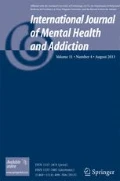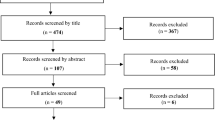Abstract
Against a background of public health, we sought to examine and explain gambling behaviours, motivations and consequences of Indigenous Australians in northern New South Wales. Adhering to national Aboriginal and ethical guidelines and using qualitative methods, 169 Indigenous Australians were interviewed individually and in small groups using semi-structured interviews. Over 100 in-depth interviews were conducted. Using thematic analysis, the results indicate a range of contrasting social and more problematic gambling behaviours, motivations and consequences. Acknowledging the cultural distinctiveness of Indigenous gambling and distinguishing between their social and more problematic gambling behaviours, motivations and consequences can assist with public health prevention, harm reduction and treatment programs for Indigenous gamblers in all parts of Australia.
Similar content being viewed by others
Notes
The authors are aware of the debate around titles used to describe Aboriginal and Torres Strait Islander Australians. Alternative terms such as Indigenous, Aboriginal, Koori and Murri are in common use. In this literature review, we use the terms Indigenous Australian and Aboriginal interchangeably.
All money references are in Australian currency.
Yarn is a colloquial word for story or anecdote (research participant).
Poker machines are also called electronic gaming machines, gaming machines, pokies or slots depending on source or use in that particular jurisdiction. TAB or Totalisator Agency Board is the name of an agency which operates a computerised system of betting calculating all bets and pay outs in a pari-mutuel style (McPherson 2007).
A press is a colloquial word for gambling on a poker machine (research participant).
Ripping off is a colloquial term for theft or fraud (participant response).
Humbug is a commonly used colloquial Indigenous word for harassment and pestering people for money with the expectation of receiving it (McDonald and Wombo 2006).
References
Aboriginal Health & Medical Research Council of NSW (AHMRC). (2007). Pressing problems, gambling issues and responses for NSW Aboriginal communities. Sydney: AHMRC of NSW.
ACIL Tasman Consulting. (2006). The economic impact of gambling on the Northern Territory. Darwin: Charles Darwin University.
Altman, J. (1985). Gambling as a mode of redistributing and accumulating cash among Aborigines: A case study from Arnhem Land. In G. Caldwell, B. Haig, D. Sylvan, & L. Sylvan (Eds.), Gambling in Australia (pp. 50–67). Sydney: Croom Helm.
Atkinson, J. (2002). Trauma trails recreating songlines: The transgenerational effects of trauma in indigenous Australia. Melbourne: Spinifex Press.
Australian Institute of Aboriginal and Torres Strait Islander Studies (AIATSIS). (2002). Guidelines for ethical research in Indigenous studies. Canberra: AIATSIS.
Borrell, J. (2008). A thematic analysis identifying concepts of problem gambling agency: With preliminary exploration of discourses in selected industry and research documents. Journal of Gambling Issues, 22, 195–218.
Braun, V., & Clarke, V. (2006). Using thematic analysis in psychology. Qualitative Research in Psychology, 3, 77–101.
Breen, H. (2008). Visitors to Northern Australia: debating the history of indigenous gambling. International Gambling Studies, 8(2), 137–150.
Breen, H. (2010). Risk factors and protective factors associated with Indigenous gambling in North Queensland. Doctoral dissertation, Southern Cross University, Lismore, Australia.
Breen, H., Hing, N., & Gordon, A. (2010). Exploring indigenous gambling understanding indigenous gambling behaviour, consequences, risk factors and potential interventions. Report prepared for Gambling Research Australia. Lismore, Australia: Centre for Gambling Education and Research, Southern Cross University.
Christie, M., & Greatorex, J. (2009). Workshop report, regulated gambling and problem gambling among aborigines from remote Northern territory communities: A Yolgnu Case Study. Darwin: Charles Darwin University.
Creswell, J. (2007). Research design: Qualitative, quantitative and mixed methods approaches (2nd ed.). Thousand Oaks: Sage Publications.
Cox, B., Yu, N., Afifi, T., & Ladouceur, R. (2005). A national survey of gambling problems in Canada. Canadian Journal of Psychiatry, 50(4), 213–217.
Cultural Perspectives Pty. Ltd. (2005). Problem gambling research report for Indigenous communities. Melbourne: Victorian Department of Justice.
Dickerson, M., Allcock, C., Blaszczynski, A., Nicholls, B., Williams, J., & Maddern, R. (1996). A preliminary exploration of the positive and negative impacts of gambling and wagering on Aboriginal people in NSW. Sydney: Australian Institute of Gambling Research.
Foote, R. (1996). Aboriginal gambling: A pilot study of casino attendance and the introduction of poker machines into community venues in the Northern Territory. Darwin: Centre for Social Research, Northern Territory University.
Geertz, C. (1983). Blurred genres: The reconfiguration of social thought. In C. Geertz (Ed.), Local knowledge: Further essays in interpretive anthropology (pp. 19–53). New York: HarperCollins.
Goodale, J. (1987). Gambling is hard work: Card playing in Tiwi society. Oceania, 58(1), 6–21.
Guba, E., & Lincoln, Y. (1989). Fourth generation evaluation. Newbury Park: Sage Publications.
Gubrium, J., & Holstein, J. (2000). Analysing interpretive practice. In N. Denzin & Y. Lincoln (Eds.), Handbook of qualitative research (2nd ed., pp. 487–508). Thousand Oaks: Sage Publications.
Hepburn, R., & Twining, C. (2005). Be with us feel with us act with us: Counselling and support for Indigenous carers. Melbourne: Carers Victoria.
Hunter, E. (1993). Aboriginal health and history, power and prejudice in remote Australia. Cambridge: Cambridge University Press.
Hunter, E., & Spargo, R. (1988). What’s the big deal? Aboriginal gambling in the Kimberley region. The Medical Journal of Australia, 149, 668–672.
Jennings, G. (2001). Tourism research. Brisbane: Wiley.
Korn, D., & Shaffer, H. (1999). Gambling and the health of the public: Adopting a public health perspective. Journal of Gambling Studies, 15(4), 289–365.
McDonald, H., & Wombo, B. (2006). Indigenous gambling scoping study—Draft report. Darwin: Charles Darwin University.
McGowan, V., & Nixon, G. (2004). Blackfoot traditional knowledge in resolution of problem gambling. Canadian Journal of Native Studies, 24, 7–35.
McMillen, J., & Donnelly, K. (2008). Gambling in Australian Indigenous communities: the state of play. Australian Journal of Social Issues, 43(3), 397–426.
McMillen, J., & Togni, S. (2000). A study of gambling in the Northern Territory 1996–97. Sydney: Australian Institute of Gambling Research.
McPherson, J. (2007). Beating the odds, the complete dictionary of gambling and games of chance. Melbourne: GSP Books.
Martin, D. (1993). Autonomy and relatedness: An ethnography of Wik people of Aurukun, Western Cape York Peninsula. Doctoral dissertation, Australian National University, Canberra, Australia.
Martin, K. (2008). Please knock before you enter, Aboriginal regulation of Outsiders and the implications for researchers. Brisbane: Post Pressed.
National Health and Medical Research Council (NHMRC). (2003). Values and ethics: Guidelines for ethical conduct in aboriginal and torres strait islander health research. Canberra: NHMRC.
National Health and Medical Research Council (NHMRC). (2007). National statement on ethical conduct in human research. Canberra: NHMRC.
Paterson, M. (2007). The regulation of ‘unregulated’ Aboriginal gambling. In G. Coman (Chair), 17th Annual National Association for Gambling Studies Conference. Cairns, QLD, Australia, November.
Patton, M. (1990). Qualitative research and evaluation methods (2nd ed.). Thousand Oaks: Sage Publications.
Petry, N., Stinson, F., & Grant, B. (2005). Comorbidity of DSM-IV pathological gambling and other psychiatric disorders: results from the national epidemiologic survey of alcohol and related conditions. The Journal of Clinical Psychiatry, 665, 564–574.
Phillips, G. (2003). Addictions and healing in Aboriginal Country. Canberra: Aboriginal Studies Press.
Productivity Commission. (1999). Australia’s Gambling Industries. Inquiry Report No. 10. Canberra: Ausinfo.
Productivity Commission. (2009). Gambling draft report. Canberra: Productivity Commission.
Productivity Commission. (2010). Gambling, Inquiry Report, No. 50. Canberra, Australia: Productivity Commission.
QSR International. (2008). QSR V.8. Melbourne: QSR International Pty. Ltd.
Queensland Department of Families, Youth and Community Care. (1996). Long term study into the impact of gaming machines in Queensland: An issues paper: The economic and social impact of gaming machines on Aboriginal and Torres Strait Islander Communities in Queensland. Brisbane: Australian Institute for Gambling Research, University of Western Sydney and the Labour and Industry Research Unit, University of Queensland.
Government, Q. (2005). Queensland household gambling survey 2003–04. Brisbane: Queensland Treasury.
Government, Q. (2008). Queensland household gambling survey 2006–07. Brisbane: Queensland Treasury.
Schluter, P., Bellringer, M., & Abbott, M. (2007). Maternal gambling associated with families’ food, shelter, and safety needs: findings from the Pacific Island families study. Journal of Gambling Issues, 19, 87–90.
Shaffer, H., & Korn, D. (2002). Gambling and related mental disorders: a public health analysis. Annual Review of Public Health, 23, 171–212.
Spradley, J. (1980). Participant observation. Forth Worth: Harcourt Brace Jovanovich College Publishers.
Steane, P., McMillen, J., & Togni, S. (1998). Researching gambling with Aboriginal people. Australian Journal of Social Issues, 33(3), 303–315.
Volberg, R. (2004). Fifteen years of problem gambling prevalence research: What do we know? Electronic Journal of Gambling Issues: eGambling, 10, February, no paginated.
Young, M., & Stevens, M. (2009). Reported gambling problems in the Indigenous and total Australian population. Melbourne: Gambling Research Australia.
Young, M., Barnes, T., Morris, M., Abu-Duhou, I., Tyler, B., Creed, E., et al. (2006). Northern Territory Gambling Prevalence Survey 2005. Darwin: Charles Darwin University.
World Health Organization (WHO). (1986). Health Promotion: a discussion document on the concepts and principles. Health Promotion, 1(1), 73–76.
Wynne, H., & McCready, J. (2005). Examining gambling and problem gambling in Ontario aboriginal communities. Ontario: Ontario Problem Gambling Research Centre.
Acknowledgements
We acknowledge and thank the Indigenous people of northern New South Wales for their generous cooperation and collaboration with this research project.
Declaration of Conflicts of Interest
The authors declared no conflicts of interest with respect to the data, authorship and/or publication of this article.
Funding
This project and subsequent authorship of this article was funded by Gambling Research Australia.
Author information
Authors and Affiliations
Corresponding author
Additional information
The researchers have full control of the primary data and it can be reviewed if requested by the journal editor.
Rights and permissions
About this article
Cite this article
Breen, H.M., Hing, N. & Gordon, A. Indigenous Gambling Motivations, Behaviour and Consequences in Northern New South Wales, Australia. Int J Ment Health Addiction 9, 723–739 (2011). https://doi.org/10.1007/s11469-010-9293-2
Published:
Issue Date:
DOI: https://doi.org/10.1007/s11469-010-9293-2



